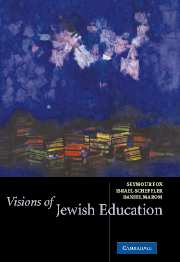Book contents
- Frontmatter
- Contents
- Preface and Acknowledgments
- About the Mandel Foundation
- Introduction
- Part I The Visions Project
- Part II Visions in Detail
- Part III Visions in Context
- 10 The Art of Translation
- 11 Before the Gates of the School: An Experiment in Developing Educational Vision from Practice
- Conclusion: The Courage to Envision
- The Visions Project: Participants and Forums
- Index
11 - Before the Gates of the School: An Experiment in Developing Educational Vision from Practice
Published online by Cambridge University Press: 08 January 2010
- Frontmatter
- Contents
- Preface and Acknowledgments
- About the Mandel Foundation
- Introduction
- Part I The Visions Project
- Part II Visions in Detail
- Part III Visions in Context
- 10 The Art of Translation
- 11 Before the Gates of the School: An Experiment in Developing Educational Vision from Practice
- Conclusion: The Courage to Envision
- The Visions Project: Participants and Forums
- Index
Summary
Background: The Goals Project
From the beginning, our project was intended to contribute to reform efforts in Jewish education as it is practiced. The project's argument for a conversation about vision assumed that such a discussion would not be confined to the academy but would take place in the settings where policy decisions are made, professional development takes place, and programs are planned and implemented.
In placing vision at the heart of the work of education, our approach differed substantially from current “visioning” efforts. We assumed that in order to improve Jewish education, educators and other policy makers would have to design their programs in relation to a broader philosophic conception of “the educated Jewish person”: For their vision to be realized, the human being nurtured in their school, synagogue, or camp would exemplify the qualities, knowledge, dispositions, and skills of their shared ideal.
The goal of “increasing the number of post – Bar/Bat Mitzvah students in our program,” for example, would be informed by an answer to the question, “What kind of Jewish learning do we see as meaningful and compelling for twenty-first-century life?”
The goal of “knowing Jewish history” would be delineated by answers to such questions as
“At what point can we say a person ‘knows’ something about history?”
“How does this knowledge affect a person's thinking, feeling, and action?”
“What in Jewish history is more and less important to ‘know’ in this way?” and
“How should this knowledge of Jewish history be integrated with the learner's knowledge of other histories or with his or her religious or scientific knowledge?”
- Type
- Chapter
- Information
- Visions of Jewish Education , pp. 296 - 331Publisher: Cambridge University PressPrint publication year: 2003
- 9
- Cited by

